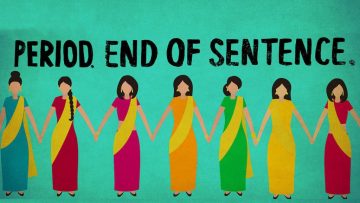
Period. End of Sentence. is an Oscar-winning documentary that tackles one of the biggest controversies in India: menstruation. This 25-minute documentary directed by Rayka Zehtabchi aims to unwrap the fears, insecurities, and ignorance associated with how many people in rural areas of India treat anything associated with menstruation or sanitary pads.
Pad Project is an organization created to improve availability and enhance awareness of hygiene for women during their menstrual cycle. “When a girl gets her period in the United States, she may miss class. When a girl gets her period in a developing country, she may never go to school again. A period should end a sentence, not a girl’s education”: this pops up as the initial quote of the Pad Project website. Unfortunately, this quote is an accurate representation of many developing nations in the world. Many teenage girls cannot afford sanitary pads and proper tools due to the high taxation of these products. Eventually, girls in these situations have to use dirty rags, leaves, and even ashes as a substitute.
Not only are these girls at high risk of infection from using alternative methods, they are obliged to miss school. These girls often quit due to being too behind in school work, or because the bathrooms are simply not good enough for the girls to change sanitary pads. According to TIME magazine, 23% of girls drop out of school when they reach puberty and 40% of schools in India do not have separate bathrooms for female students.
However, this problem is being resolved, as a man, Muruganantham, invented a machine that makes sanitary pads that can be sold without tax, making them significantly cheaper. These pads are also distributed in local shops, making them more accessible than before. Additionally, they are made from locally produced materials and are more biodegradable. Muruganantham points out, “Menstruation is the biggest taboo in India.”
Muruganantha is now
Additionally, after the machine was invented, many women were employed to work in pad factories, allowing them to work for a steady income in a female-only, safe environment. The Pad Project team states that “it helps both girls and women gain independence.”
This documentary consists of a series of interviews of both men and women. The film also displays the consequences many women go through when they cannot afford sanitary pads. Rags used as a substitute for sanitary pads can only be disposed of in specific areas, and women have to walk great distances through farmlands every evening. This is extremely risky and is not a proper disposal method as stray dogs often bring back disposed used rags and leave them laying on streets.
A woman who was interviewed for the documentary shared her story and experience working as a sanitary pad manufacturer. She states that though the topic of menstruation has gained more awareness in India, she still covers the title of her real job by telling her father she manufactures diapers for children: “It was embarrassing, if I can’t talk to my friends about this then how can I tell my father?”
The cultural and religious taboos associated with women’s menstruation has led it to be viewed negatively, and even as something that renders women dirty. For example, the Sabarimala temple bans women who are on their periods from entering because they are thought to be “impure” or “dirty”. This has created a negative stigma against a natural, biological feature of womanhood.
Period. End of Sentence. is currently on Netflix has and won the 91st Academy Award for Best Short Documentary.
For more information visit TIME Magazine, and The Pad Project Website.